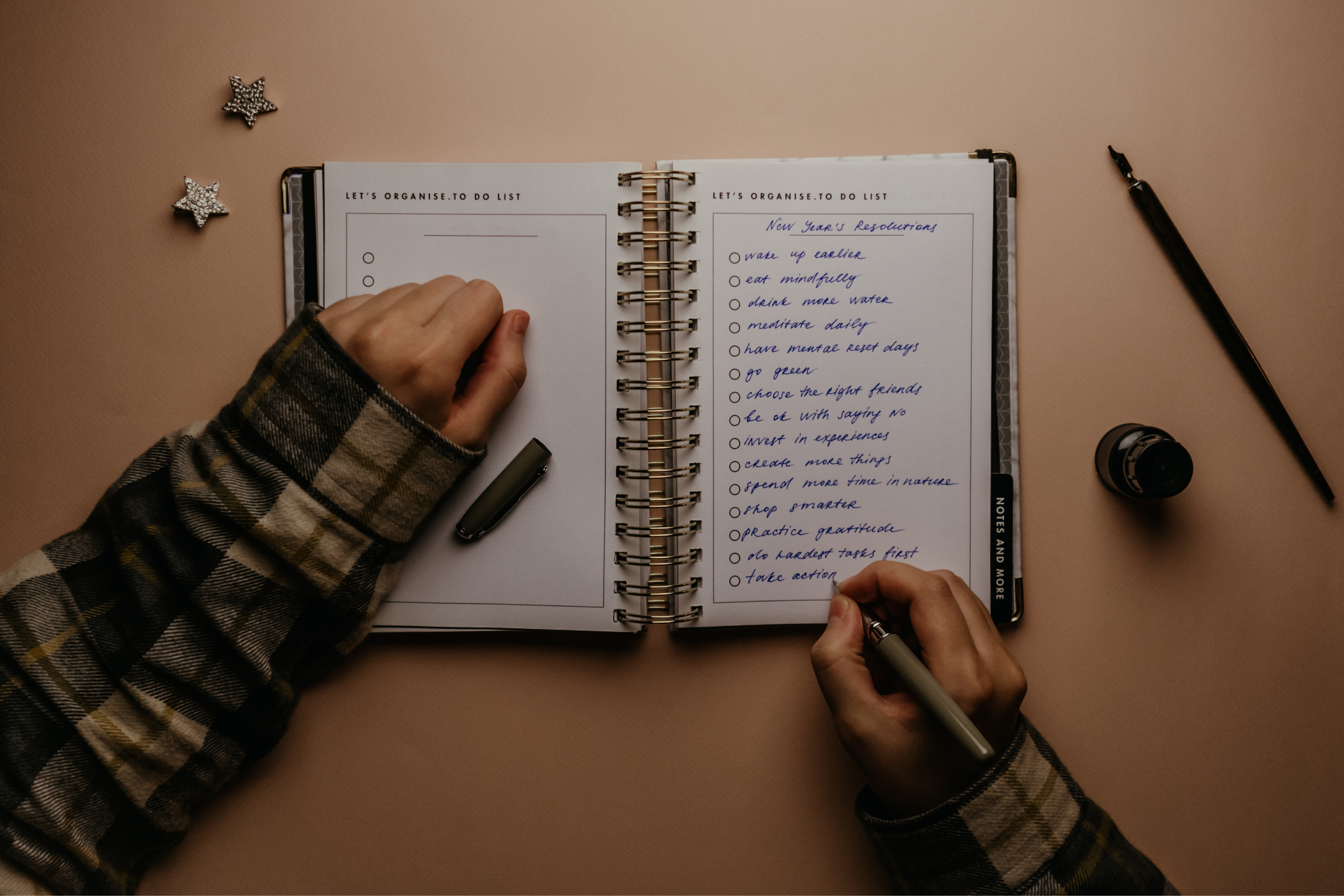30 Day Challenge Ideas to Improve your Finances
A 30 day challenge can be a great way to save money and make progress toward your goals.
Listen to the podcast episode now
Find the podcast on:
Apple | Google Podcasts | Spotify | Amazon Music | Pandora | Stitcher | iHeartRadio | Deezer | Pocket Casts | PlayerFM
I recently realized my husband and I are secretly pretty competitive, and we’re using that to our advantage with 30-day challenges to save money and pay off debt. We’ve got visual trackers all over the house—one in the office for every debt we’re chipping away at and a 30-day challenge tracker on the fridge to keep us from eating out. It was honestly shocking to see how much we spent at restaurants when we started tracking, so we’re working hard to cut that down.
This challenge has pushed us to try new healthy habits like cooking more and making sure we have at least one home-cooked meal in our daily routine. We’re making small changes that feel doable, like planning meals ahead and packing lunches. By the end of the month, I’m hoping we’ll not only save money but also feel better about our eating habits and how we’re living day to day.
Thirty days feels like the perfect amount of time to break old habits and set up something that actually lasts. It’s kind of exciting to see what else we can tackle next.
Challenge yourself
Breaking that old habit now could free up so much money in your budget. And there are so many ways you can challenge yourself to better your financial situation. It’s satisfying to cross off every single day and motivating to see how long you can keep that streak going. My thirty-day challenge tracker is open-ended, so make it your own.
You can:
- not eat out
- spending nothing beyond bills
- spending nothing beyond bills & groceries
- not buy clothes
- spend nothing on hobbies
- spend nothing on your “habit” – the area where you spend without thinking. Lattes, drive-thru meals, snacks from the cafeteria, sodas from the gas station on the way home. Break that habit now.
Starting small like this is a good idea if you want to build new routines and make lasting changes in your daily life. It’s a great way to step out of your comfort zone and try something new.

Tips for Success
Making a 30-day challenge work for you is all about keeping it simple and manageable. A little planning upfront can make a big difference, and staying consistent will keep you on track. Whether you’re tackling a new challenge to save money, break an old habit, or try something different, these tips will help you stick with it and see real progress. Remember, making small, consistent changes is the best way to create lasting, positive change in your everyday life.
What are you tracking?
Before you jump into your challenge, make sure you know exactly what you’re doing. If you’re starting a new habit like skipping fast food, does that mean no drive-thru coffee? If you’re only spending on bills, what’s your plan if you run out of groceries? Do you have some room for slip-ups? Writing it all down on your to-do list or a tracker and keeping it in plain sight will help you stay focused on why you’re doing this in the first place.
Start now
One of the best things about a 30-day challenge is that you don’t have to wait for a specific date like the first day of the month to start. You can jump in whenever you’re feeling motivated! Just write the date down at the top of each day’s section so you can keep track of your progress.
Whether it’s a fitness challenge, a new habit, or a novel mind-calming idea for your mental health, starting now sets you up for real personal growth.
You don’t need to wait for a new year or the start of the week. Instead, you start moving today! Starting with a few small steps every day can lead to some serious long term results. Stay focused on your big goal, and you’ll see good things start to happen at some point. Every little bit of effort counts, so don’t underestimate the power of getting started NOW.
Have a visible reminder
Put your 30 Day Challenge Tracker somewhere you’ll see it all the time, like on the fridge, bathroom mirror, or even in your bedroom closet. Just having it there can help keep you on track. If your challenge is cutting out drive thru stops, tuck it in your car or wallet so you spot it when the temptation hits.
This little reminder can be a powerful tool to keep you focused on why you’re doing this in the first place. You might even want to add some positive affirmations next to it or keep a journal to note your progress. Seeing your goals in plain sight makes it way easier to stay motivated. Whether you’re working on physical fitness or cutting down on screen time, having that reminder there makes it that much easier to stick to the plan.

Make the reward worth it
Decide on a reward that’s motivating enough to keep you committed to your challenge. For example, we planned our recent 30-day no-restaurant challenge to end just before my birthday so we could treat ourselves to takeout. This made it easier to stick with the challenge, especially when we were tempted by the thought of grabbing fast food or a juicy, steaming hot grass-fed steak (Sure, it’s healthy, but we’ve got a challenge to conquer!).
If your goal is saving money, one nice dinner for the month is likely cheaper than grabbing three lattes a week and take-out a couple of times each week.
One more thing: when you’re trying to break a habit, choose a reward that supports your overall goal. If you’re working on improving your physical health, you could reward yourself with a new workout routine or a worthy piece of equipment. And i your challenge is focused on daily exercise, you could treat yourself to something related to your fitness journey, like a new pair of shoes or a session with the best personal trainer around.
For something like weight loss, maybe your reward could be something that aligns with your progress, like a new outfit or a fun activity to celebrate. The trick is to make sure your reward is meaningful and feels worth the effort.
Whether it’s a small treat or a big prize at the end, a well-thought-out reward can keep you motivated on the tough days. The most important thing is that your reward matches the effort you’ve put in. That way, when the hardest part comes, you’ll have something to look forward to that keeps you going

Ensure your people are on board with the 30 day challenge
Make sure the people around you are on board with your 30-day challenge. If you live with other adults who are also part of your daily routine, it’s important to get their buy-in—especially if the challenge is going to affect them too. You can definitely set up a challenge that’s just for you, but if it impacts your family members or your partner, you’ll want them to be on the same page. For example, don’t try to force your partner to give up their daily latte if they’re not in on the same goals as you.
Instead, turn this challenge into a fun conversation. Talk with your partner about how saving money (or whatever your goal is) can actually be exciting if you approach it the right way. Chat about why you’re doing it, whether it’s to improve your fitness level, save up for big purchase such as a car or rental property for extra family income, or just try something new. Share your goals and dreams, and walk bold together towards a fresh start.
This isn’t just about making sacrifices, it’s about finding ways to make things work as part of your routine. When you get the whole family involved, it’s a lot more fun. Maybe you even want to keep track of progress with a couple of minutes of journaling each day, or talk about it during a phone call. Make sure that whatever challenge you set up isn’t something that’s too much of a drastic change for anyone, but also encourages everyone to grow together.
Download your free 30 Day Challenge printables now
Blue version:
Pink version:
and start!
Set specific goals for your 30-Day Challenge
To make your 30-day challenge successful, the key is setting specific, measurable goals. Instead of something vague like “save money” or “eat healthier,” get into the details. For example, “I’ll cut down on takeout to once a week” or “I’ll save $100 this month by eliminating unnecessary purchases.”
These goals are easy to track, and they give you a clear target to aim for. Break them down further if needed. Decide which categories of spending to cut back on or how many home-cooked meals you’ll aim to have per week. The more precise you are, the easier it is to measure your progress and stay on track.

Create a plan of action
Now that you’ve set your goals, it’s time to map out how you’re actually going to hit them.
Don’t just say, “I’m not eating out this month” and leave it at that. Think through how you’re going to make it happen.
Maybe you meal prep on Sundays to avoid the temptation of hitting the drive-thru or set a weekly budget to help you keep track of how much you’re spending. Having a game plan makes sticking to your challenge way easier.
So, plan out your meals and snacks to make it less likely that you’ll be scrambling last minute and grabbing fast food. And hey, things don’t always go as planned, so give yourself some wiggle room for slip-ups. The whole idea is to have a plan in place, so when cravings or temptations pop up, you’ve already got a solid move to make.

Track progress
The saying “what gets measured gets achieved” really nails it, doesn’t it? Tracking your progress is a total game-changer when you’re working through a 30-day challenge. It’s easy to forget how far you’ve come, especially when life gets crazy.
But when you actually see your progress, whether it’s in a notebook, on a calendar, or even in an app, it just makes everything feel more real and rewarding.
You don’t need anything fancy. Simply keep track of where you’re at. Looking back at everything you’ve already done will give you the push to keep going.

Celebrate small wins
And don’t forget to celebrate those small wins! Don’t wait until the end of the 30 days to celebrate your progress. Celebrate the small wins along the way! Every day you stick to your challenge is a win, even if it’s just a little step forward. Whether you passed on that afternoon latte or decided to skip the takeout, those small wins really add up.
Take a minute to recognize what you’ve accomplished. You might not see huge changes yet, but trust me, you’re making progress. Every day you stick to your goal gives you more momentum to keep going.
If it helps, reward yourself with something small, or just take a moment to appreciate the progress you’ve made. The more you celebrate those little wins, the more motivated you’ll feel to keep going. Success literally fuels success!

Adjust as needed
Things won’t always go as planned. And that’s totally fine. Life happens, you know. Maybe you miss a workout because your schedule gets crazy, or you end up spending more money than you intended because of an unexpected expense. Don’t stress, just roll with it.
For example, let’s say you’re doing a no-restaurant challenge, but then you get caught in a last-minute work meeting and end up grabbing takeout. Instead of throwing in the towel or beating yourself too hard because of it, try adjusting. Maybe you allow yourself one takeout meal a week, or cook a little extra the night before to make sticking to your budget easier. Or, if you end up overspending in one category, look for ways to cut back in another, like skipping a few non-essential purchases for the week.
It’s about being flexible and not letting little setbacks to stop your progress. If things don’t go perfectly, just adjust and keep moving forward. Because in the end, it’s not about being perfect, it’s about making progress. And a little wiggle room will make sticking to your challenge a lot less stressful.

Get creative with rewards
hen it comes to rewarding yourself after finishing a 30-day challenge, think outside the box. It’s not just about treating yourself to something big or expensive. Sometimes the best rewards are the ones that are simple and a little creative.
Instead of always reaching for that pricey purchase, try rewarding yourself with something that’s in line with your goals but feels special in its own way. For example, if you’ve been cutting back on fast food, treat yourself to a homemade spa night with a new face mask or a relaxing bath. Or if you’ve been sticking to your budget, a fun (and free) reward could be a day exploring a nearby park, checking out a free local event, or spending the day doing something you love, like reading or taking a walk.
The idea is to make the reward feel like a win, but also have it tie back into what you’re working on. If you’re hitting fitness goals, maybe you treat yourself to a fun new workout playlist or download an app that helps you stay motivated.
Or, if saving money is your goal, you could reward yourself with a cost-free treat, like spending the afternoon on a hobby you’ve been neglecting or watching a movie you’ve been wanting to see.
Make the reward something that feels fun and meaningful, but in a way that doesn’t cost you a lot of money. Get creative, and let the reward add some extra joy to your journey.

Keep It fun and flexible
Let’s face it, things don’t always turn out as planned or expected, and that’s okay. That’s why it’s super important to stay flexible during your 30-day challenge. You might have a day where things don’t go how you hoped, and that’s totally normal. If you mess up in some way, don’t let it ruin everything. The goal is progress, not perfection. Achieving results that don’t meet your expectations is better than not starting at all and not experiencing failure.
For instance, if your goal is to work out every morning, but you wake up late and miss your session, don’t throw in the towel. Just make a quick switch. You could squeeze in a quick 10-minute workout at lunch or go for a walk after dinner. You didn’t let one missed workout turn into a whole week of giving up, and that’s what counts.
Or maybe you’re trying to cut out sugar, but then someone brings in donuts at the office. Instead of thinking, “Well, I messed up, so why not just eat the whole box?” try something like having just one bite, or maybe even grabbing a healthier snack. And hey, if you end up having a donut, don’t sweat it, just get back on track.
Some days, you might be too tired to cook or bake that healthy sourdough bread your loved ones need, so you don’t end up buying store-bought versions, or you might be too busy to stick to your plan—and that’s okay. Instead of grabbing fast food, try a healthier option. Maybe order a salad from a place with fresh choices or heat up a frozen meal you’ve got in the fridge.
And stay happy, bubbly, and real, knowing that nothing in life is worth losing your peace of mind over. This isn’t to say you should be less serious about things that truly matter to you, obviously.

Stay consistent, even when it’s tough
Consistency is what really makes the difference when it comes to sticking to your goals. It’s not about being perfect every day; it’s about showing up and doing your best, even on the tough days. You won’t always feel like it, and you won’t always nail it, and that’s totally okay. Life throws curveballs, but that doesn’t mean you give up or start feeling sorry for yourself.
Take, for example, cooking healthier meals. Maybe you get home late or you’re just too wiped out to cook. Instead of calling for takeout, try a healthier frozen meal or whip up something simple like a salad with some grilled chicken or beans you have on hand. It doesn’t have to be a full-on gourmet meal—it just needs to be a better option than grabbing expensive restaurant junk.
On the days when cooking feels like too much, try swapping things out for healthier options. Instead of reaching for chips, go for some carrot sticks or a handful of almonds. If sticking to your meal plan feels impossible because you’re too busy, see if you can work in a smoothie or just grab some fruit while you’re on the go.
Consistency isn’t about being perfect every single day; it’s about finding those small ways to keep moving forward. So when your day gets derailed, instead of getting frustrated, just take a breath and figure out one little thing you can do to stay on track.

Final thoughts
In the end, a 30-day challenge is a simple but powerful way to level up your finances and habits. Whether you want to save money, break an old habit, or start fresh with new routines, it gives you a manageable path to real change. Start small with goals that are easy to tackle, track your progress, and reward yourself along the way. And don’t forget—being flexible is important. If you hit a bump, don’t stress. Just adjust and keep going. The key is staying consistent, staying motivated, and, most importantly, making it fun. So why wait? Start today, and you’ll see those small, positive changes turn into big results. All it takes is that first step, and before you know it, you’ll have made a huge difference in just 30 days.







